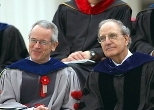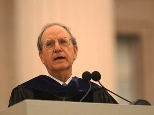George J. Mitchell, the former U.S. senator who helped Northern Ireland reach an historic peace agreement and chaired the International Fact-Finding Committee on violence in the Middle East, told 2,202 MIT graduates that he believes a resolution to the Middle East conflict is possible, but it will take both sides to endorse the other's needs.
MIT awarded 1,171 bachelor of science degrees, 1,096 master's degrees, 213 doctoral degrees and five engineer's degrees at its 137th Commencement.
Mitchell served as chairman of the peace negotiations in Northern Ireland. Under his leadership, an historic accord ending decades of conflict was reached by the governments of Ireland and the United Kingdom and the political parties of Northern Ireland. In May 1998, the Good Friday peace agreement was overwhelmingly endorsed by the voters of Ireland and Northern Ireland in a referendum. Mitchell's leadership earned him worldwide praise.
In his MIT speech, Mitchell said the Palestinians want an independent, economically viable state and the Israelis want security. "Neither can obtain its objectives by denying to the other side its objectives," he said. "Both sides recognize that the only way to achieve a lasting, two-state solution is through negotiation." Yet the mistrust of each side for the other is total, he said. "They are caught in a zero-sum conflict in which both are suffering."
Nevertheless, Mitchell declared that "there is no such thing as a conflict that can't be ended. Conflicts are created and sustained by human beings; they can be ended by human beings."
One problem is that with each recurrence of terrorism, Americans react with increasing despair. "Americans should not turn away when the inevitable setbacks occur," he said. Part of the responsibility that accompanies Americans' good fortune in living in a "free and open society," he said, is to help others work toward similar freedom.
In 2000, President Clinton, Israel's then-Prime Minister Ehud Barak and Palestinian Liberation Organization Chairman Yasir Arafat asked Mitchell to chair the Middle East fact-finding panel. The committee's recommendation, widely known as the Mitchell Report, was endorsed by the Bush administration, the European Union and many other governments.
Mitchell was appointed to the Senate from Maine in 1980 to complete the unexpired term of Sen. Edmund S. Muskie, who resigned to become Secretary of State. He was elected to a full term in 1982 and went on to a distinguished career spanning 14 years. From 1989 until he left the Senate in 1995, he served as Senate majority leader.
In his charge to the graduates that followed Mitchell's speech, President Charles M. Vest urged the Class of 2003 "to help us build a world community that embraces and values different cultures and heritage, that respects the individual and works toward the betterment of all of its people."
The texts of Mitchell's and Vest's speeches are available online at /newsoffice/nr/2003/comm.html.
A version of this article appeared in MIT Tech Talk on June 12, 2003.







